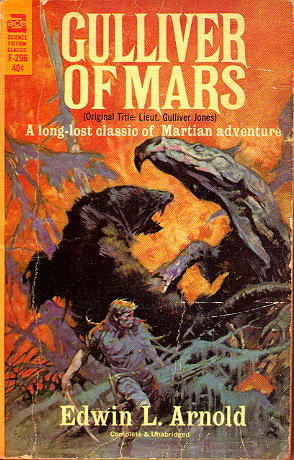Chapter I — Gulliver of Mars
byChapter I begins not with triumph but with quiet discontent. The protagonist, Lieutenant Gulliver Jones, is weighed down by the burden of unrealized dreams and the ache of a love that never fully bloomed. Walking the rain-washed streets of New York, he drifts through alleyways as if the city itself has grown tired of offering him meaning. The night seems ordinary, dreary even, until his path crosses with a figure slumped in the shadows. This old man, clad in unfamiliar garb and cradling a thick, foreign-looking rug, seems displaced from time and place. Something in the old man’s silence demands attention. The moment feels heavy, and Gulliver senses that this encounter is no accident.
Acting on instinct, he carries the dying man to the hospital. But by the time help arrives, life has already slipped away. Nothing remains but mystery—and that strange rug, humming with secrets of its own. Left in Gulliver’s care almost by fate, the rug feels like more than fabric. The patterns twist subtly when viewed from different angles, and the colors shift like a dream fading at dawn. Though the city sleeps on, something has changed. Gulliver now holds a fragment of another world in his hands. Its presence haunts him in ways he can’t yet name.
That night, unable to sleep, he unfurls the rug across his floor. The bead the man dropped rolls silently beside it, pulsing with a soft light. Gulliver’s thoughts drift toward escape—escape from failure, from a lifeless career, from love unreturned. The rug, as if listening, begins to respond. The threads ripple without breeze. Symbols once dormant begin to glow. Gulliver touches one, and for a heartbeat, he feels his body pulled—not physically, but spiritually. A force, ancient and unknowable, tugs at the roots of his being. He gasps. The room narrows, spins, and settles.
The sensation passes, but not the yearning it awakens. Gulliver finds himself unable to let go of the rug. The hospital, the city, the routines—they all seem less real now. The bead, though small, hums with strange power. In it, he sees glimpses of landscapes that do not exist on Earth. Volcanoes shaped like thrones. Rivers that shimmer like glass. Faces that are beautiful and impossible. Gulliver laughs bitterly, brushing the visions away. Yet they return. Again and again.
He begins to question whether the rug is a hallucination born of despair, or an artifact of something far greater than he can imagine. Each night, he returns to it. Each night, the rug gives him more—more patterns, more warmth, more impossible dreams. And slowly, a quiet certainty grows. He has been chosen. Not by the government, not by lovers, not by fate as defined by Earth. But by something older, more playful, more dangerous.
Then one evening, as lightning cracks the sky and the city groans under a sudden storm, he places the bead at the rug’s center. The light flares. Wind rises from nowhere. Furniture trembles. He steps onto the fabric, not knowing why. A whisper—low and rhythmic—fills the room. It says nothing clearly, but the message is unmistakable: come. He closes his eyes. A deep silence falls. When he opens them, the world has changed.
He no longer stands in his apartment. Around him are red sands, a pale violet sky, and air that tastes both sharp and pure. He is no longer just Gulliver Jones, disillusioned officer of a stagnant post. He is a stranger on a strange world. His heart pounds with fear and wonder. There is no turning back now. The rug has fulfilled its silent promise.
This opening chapter offers more than a prelude—it captures the precise moment where possibility is born from despair. For readers, Gulliver’s journey is a metaphor for every unspoken desire to break from monotony. His longing, his love, his failures—these become the very fuel for transformation. Adventure begins not in triumph, but in the aching space between who we are and who we might yet become. And in that space, anything—yes, even a Martian sunrise—can unfold.

